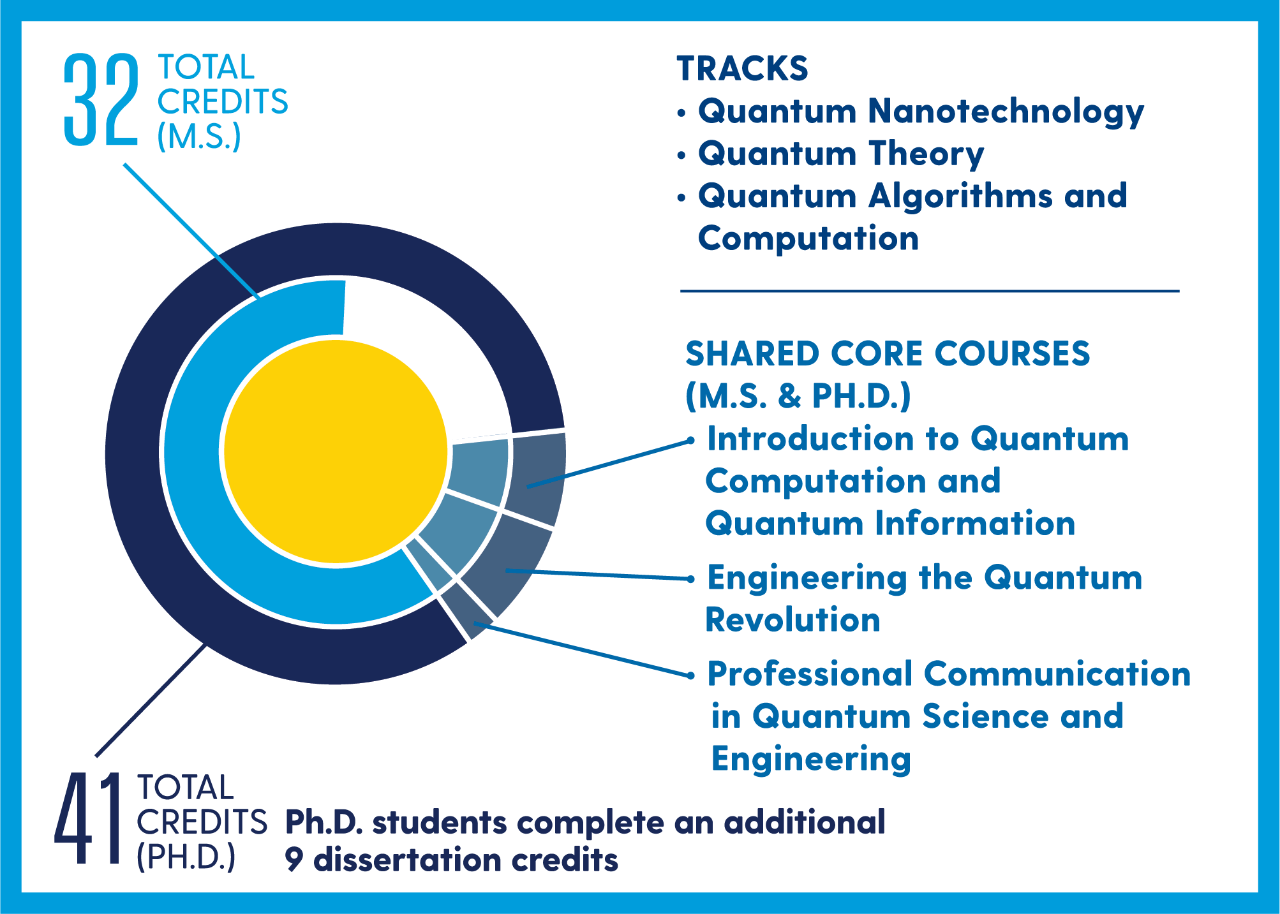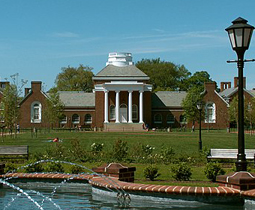

Quantum Science and Engineering: Ph.D., M.S.
Prepare for the quantum revolution
Quantum science and engineering is the design and study of materials, devices and algorithms that take advantage of the unique properties of quantum systems to realize technologies that can outperform their classical counterparts.
With a curriculum developed to maximize hands-on, project-based learning, University of Delaware graduate students are trained to use state-of-the-art equipment ranging from semiconductor nanofabrication tools to high-performance computers in one of the only programs offering both M.S. and Ph.D. degrees in quantum science and engineering. The interdisciplinary program leverages the talents of diverse experts from departments throughout the University.
EXPLODING TECHNOLOGY
A report by Fortune Business Insights, “Quantum Computing Market, 2021-2028,” said the global quantum computing market is expected to grow from $486.1 million in 2021 to $3,180.9 million in 2028, which equates to a compound annual growth rate of 30.8%.
Acknowledging this potential, the Royal Swedish Academy of Sciences awarded the 2022 Nobel Prize in Physics to Alain Aspect, John F. Clauser and Anton Zellinger, who used entangled quantum states in groundbreaking experiments that demonstrated the possibility and feasibility of new technologies based on quantum information.
The emerging quantum industry needs people with different training than what is provided by traditional disciplines. Our degree program is designed to provide this mix of skills and to develop a shared vocabulary that allows people working on every aspect of quantum technologies — from material foundations to quantum algorithms — to communicate effectively.
New Dimensions for Encryption
How Quantum Computers Break the Internet: youtube.com/watch?v=-UrdExQW0cs
Program Benefits
- Choose between M.S. and Ph.D. degrees
- Learn from award-winning faculty taking a project-based approach
- Benefit from interdisciplinary expertise in engineering, physics, information science and physics
- Receive hands-on access to world-class labs and facilities
- Acquire the skills and knowledge required for the quantum workforce that will carry this field into the future
the SECOND Quantum Revolution IS HERE
The first quantum revolution occurred when scientists discovered quantum mechanics, which led to technologies ranging from lasers to MRI machines to the engineering of new molecules for biomedical applications. The second quantum revolution started with the realization that quantum information processing could be much more powerful than the digital information processing that enabled the information and computing revolution of the past few decades.
The National Quantum Initiative Act, signed into law on Dec. 21, 2018, directs the U.S. president to establish the goals and priorities for a 10-year plan to accelerate the development of quantum information science and technology applications.
In response to the needs of industry, our curriculum is designed to rapidly introduce all students to the fundamental concepts of quantum mechanics and quantum information processing, establish a shared vocabulary and knowledge base that accelerates collaboration across disciplines, and train students with the professional skills they need when they join the workforce.
A Great Career Choice
According to the Harvard Business Review, "Just as classical computers reduced the cost of arithmetic, quantum presents a similar cost reduction to calculating daunting combinatoric problems."
IBM, Microsoft, HP, Northrop Grumman and Google all have big quantum initiatives, as do many smaller businesses and startups. Citing a dearth of available talent, McKinsey Digital's June 2022 "Quantum Technology Monitor" noted that quantum technology job postings in 2021 outpaced qualified talent by nearly 300%.
Starting salaries for quantum physicists, quantum computer scientists, quantum computing software engineers and other quantum jobs regularly exceed $100,000.
A Race to New Heights
Companies, countries battle to develop quantum computers | 60 Minutes: youtube.com/watch?v=K4ssT6Dzmnw
About the Program
$1,352
per Credit
In order to maintain a strong, diverse and substantial pool of applicants, our tuition is designed to make us competitive, especially with our peer institutions.
17-20
Credits in both Core Curriculums
M.S. and Ph.D. students take the same core and elective courses. The 32-credit master’s can be completed in as little as one year because the coursework is followed by a relatively brief capstone project. The Ph.D. entails extensive dissertation research with a faculty advisor and is typically completed in five to six years.
25+
Affiliated Faculty
Full-time faculty members from UD's College of Arts and Sciences and College of Engineering — who are leaders in their field — share their individual expertise and unite to equip students with the tools and knowledge they need to succeed.
From Our Students
-
Bao Bach
Ph.D. student, Quantum Science and Engineering
"There are not many U.S. universities that offer this kind of interdisciplinary program dedicated to quantum science and engineering. UD has very strong labs and is very good at experimental science.”

Groundbreaking Research
With many of our affiliated faculty members conducting funded research projects in a variety of quantum areas, students earning a degree in quantum science and engineering have the opportunity to discover alongside leaders of industry and find their voice in the research community.
Master's or Ph.D.?
M.S. and Ph.D. students take the same core and elective courses. The master’s degree can be completed in as little as one year because the coursework is followed by a relatively brief capstone project. The M.S. program is designed for people who want to learn the foundations of the field and enter the workforce relatively quickly. The Ph.D. program typically takes five to six years because the coursework is followed by several years of research under the supervision of a faculty advisor culminating in a Ph.D. dissertation. The Ph.D. program is designed for people who want to develop the capacity to perform – and lead – independent research in the field.
Explore these degree options more in depth:
What to Know Before Applying

The QSE graduate program offers both M.S. and Ph.D. degrees. Students will follow one of three tracks: 1) Quantum Nanotechnology, 2) Quantum Theory or 3) Quantum Algorithms and Computation. Students will indicate the track to which they are applying at the time of application and are welcome to consult with the graduate advisor when making this decision. In general, students planning to do experimental work will follow the Quantum Nanotechnology track. Students planning to do theoretical work that requires knowledge of physical systems (e.g. atoms or solid-state materials) will follow the Quantum Theory track. Students planning to work on quantum algorithms, quantum computing applications or classical computing that facilitates quantum computing will follow the Quantum Algorithms and Computation track. In addition to the core curriculum, they share with M.S. students, Ph.D. students will complete 6 credits of research and 9 credits of dissertation. These additional credits are not tied to specific courses and will vary in the time it takes to complete.
The application deadline is December 1 for Ph.D. students and March 1 for M.S. students. Review of applications begins December 1. Applicants are typically notified of acceptance in mid-March and expected to respond to the offer by April 15.
The University of Delaware’s graduate application system is designed to put the applicant in control of not only the application but all documents associated with that application. You should not need to send a single item by mail during the applicant stage. Self-managing your own application in this way is possible because we have designated areas within the application where each required document should be uploaded. Applicants are required to provide transcripts, a personal statement and three letters of recommendation. International applicants are asked for some additional materials.

